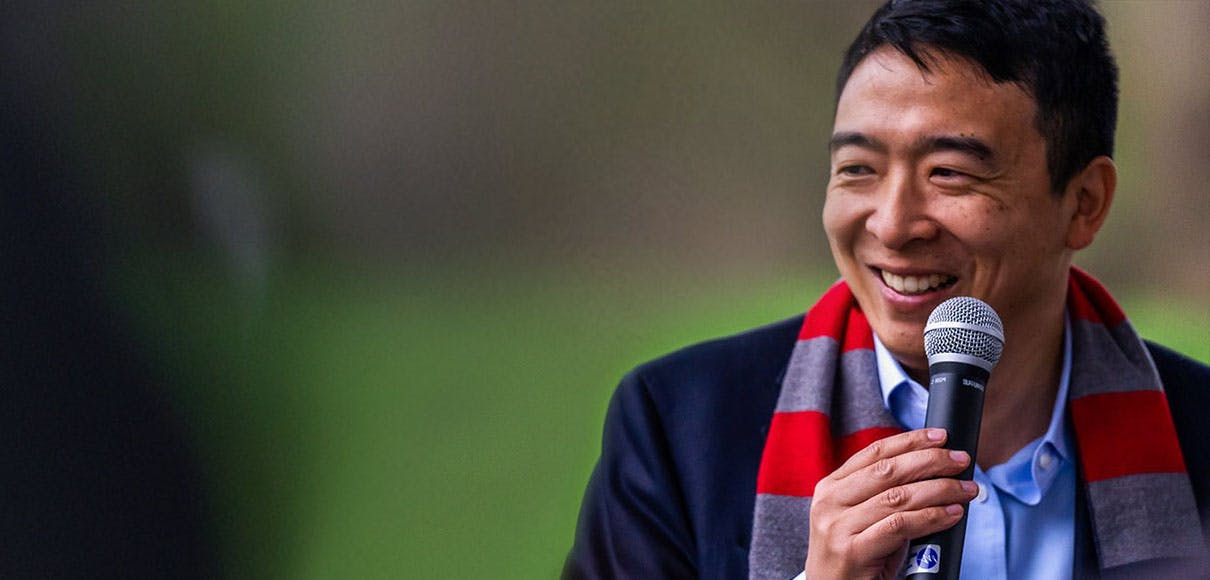Former presidential candidate and entrepreneur Andrew Yang addressed the SPU community, predicting that 45 million American workers could lose their jobs in the next 12 years as automation trends accelerate.
“We are in the midst of the greatest calamity in generations,” Andrew Yang said in a virtual address to SPU and the broader community on Oct. 9. “Tens of millions of jobs are gone — for good. We’ve seen 10 years’ worth of change in the last 10 weeks. Forty-two percent of the jobs lost during this crisis are not returning.”
The trend toward automation was well underway before the current health crisis, Yang said, but the pandemic has accelerated the automation of labor.
Yang, an American entrepreneur, philanthropist, and former presidential candidate, was the keynote speaker for Seattle Pacific’s 2020 Virtual Days of Common Learning. The weeklong series (historically, an annual day of seminars) gave students, faculty, staff, alumni, and the broader community an opportunity to engage in deep thought and conversation around a topic of focus, interest, and concern.
This year’s event, Oct. 5 to Oct. 9, addressed, “The Future of Work in the Age of a Pandemic, Sociopolitical Disruption, and Rapid Technological Change.”
Two-thirds of Americans have a high school degree as their highest level of education and work in these five areas of employment:
- Administrative/clerical (including call centers)
- Sales/retail
- Food service/food prep
- Truck driving/transportation
- Manufacturing jobs
These sectors represent half of all American jobs, Yang said.
The trend toward automation was well underway before the current health crisis, Yang said, but the pandemic has accelerated the automation of labor.
He pointed to present and impending threats: 30% of stores and malls are closing their doors, thanks to the meteoric rise of online retailers like Amazon. Some food service jobs have been automated for greater consumer safety. And self-driving cars and trucks will upend the transportation sector in the not-so-distant future.
These trends and others, Yang said, define the fourth industrial revolution (a term first coined in 2015 by Klaus Schwab of the World Economic Forum). It refers to the ongoing automation of traditional manufacturing and industrial practices through the use of modern smart technology. Experts expect this era to be marked by breakthroughs in emerging technologies such as robotics, artificial intelligence, nanotechnology, biotechnology, machine-to-machine communication, 3D printing, and more.
“We are way, way behind trying to figure out what that’s going to mean for us as a society,” he said.
In his 2018 bestseller, The War on Normal People: The Truth About America’s Disappearing Jobs and Why Universal Basic Income Is Our Future, Yang described how the shift toward automation will create a tsunami of unemployment. A recent estimate predicts 45 million American workers will lose their jobs within the next 12 years.
Yang believes the consequences of these trends are already being felt across American communities in the form of political unrest, drug use, and other social ills.
“We’ve been stuck in the 20th century, preparing people for an industrial economy that may or may not even exist,” he said.

Yang noted that current college students will graduate in the midst of this transformation.
“The good news is that you’re equipping yourselves with skills and learnings, and you’ll be much better prepared than most,” Yang said. “You can be directed and trained toward things that will become more relevant, not less.”
In order for manual, repetitive work to be replaced with the so-called “caring economy” — human-centered pursuits like mental health counseling, teaching, caring for the aging, and more — Yang believes the country must have economic resources in place to activate those opportunities.
“To me, this is something our government must lead in,” he said. “We’ve come of age in an era where the marketplace is supposed to figure it all out.
“In this instance, the marketplace is going to fail us at an epic level. The market measurement is going to be punitive to a whole set of people,” Yang said.
Yang cited these impending concerns as motivation for his presidential run. “I thought we needed to start recognizing intrinsic human value through something like Universal Basic Income [providing all citizens with a guaranteed income],” Yang said. “And there has to be a massive investment in these jobs of the future throughout the fourth industrial revolution.”
With the current state of job loss, Yang said action is needed. “We have a hole of around 17 million jobs that we need to fill, and we need to get to work as quickly as possible.
“We have to do everything we can to invigorate the humanity in our economy and opportunities. We are trying to redefine why we do what we do, how we value it, and how these things you enjoy doing can become the center of a new economy.
“This is a call to action. The market will not start to value creativity and helping people at a high enough level to become the economy of the future unless we come together collectively and make those determinations right now,” he said.
Yang’s address was followed by a question-and-answer session with SPU faculty who led the week’s thematic seminars and undergraduate and graduate students.




